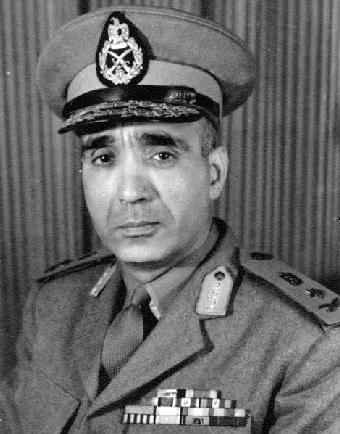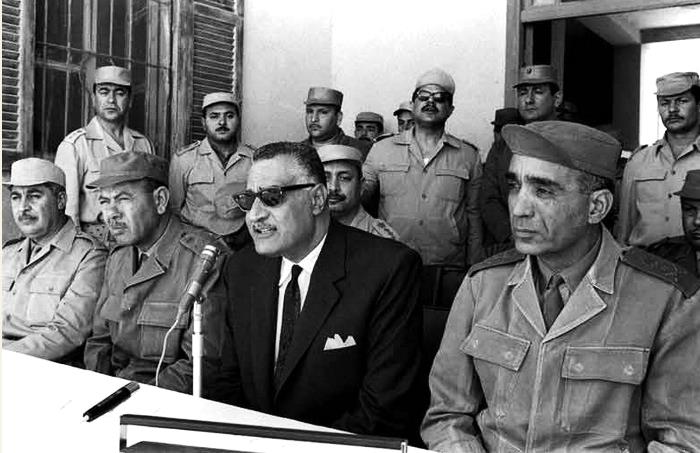<Back to Index>
- Commander of the Jordanian Forces and Chief of Staff of the Egyptian Armed Forces Abdul Munim Riad, 1919
PAGE SPONSOR

Abdul Munim Riad (22 October 1919 - 9 March 1969) (Arabic: عبد المنعم رياض) was a general and chief of staff of the Egyptian Armed Forces. He was killed along with several of his aides in an Israeli mortar attack on 9 March 1969. Riad commanded the Jordanian forces in the 1967 Six Day War.
The day he was killed on was announced by Egypt as the Martyr day of Egypt.
Abdul Munim Riad was born 22 October 1919 in Tanta, Egypt. His family moved to Fayoum where he was raised. After graduating from high school, he joined the School of Medicine, but after two years joined the War college as he originally wanted. He graduated from college in 1938 and got his master's degree in military sciences.
Abdul Munim Riad fought in World War II against German and Italian forces. In 1960, he was appointed Chief of Staff of Artillery. In 1961, he became the vice president of operations division under the chairmanship of staff of war and the adviser air force command for air defense. Between 1962 and 1963, as a major general, he enrolled in a special session in school of missile antiaircraft artillery. In 1964, he became the chief of Staff of the consolidated Arab leadership. In 1966 he was promoted to a lieutenant general and received his fellowship of the Higher War College from Nasser Higher Military Academy.
Has won numerous medals and decorations, including several from Lebanon and Jordan.
In May 1967, After King Hussein traveled to Cairo to sign the Joint Defense Group, Abdel - Moneim Riad was appointed commander of the advanced command center in Amman, and when the 1967 War broke out Lieutenant General Abdul - Moneim Riad was appointed Commander of the Front in Jordan. On 11 June 1967, he was selected as Chief of Staff of the Armed Forces and began with the Egyptian Minister of War and Commander of the armed forces, Mohammed Fawzi, to rebuilt and organize the army. In 1968, he was appointed Assistant Secretary General of the League of Arab States.
Abdul Munim Riad achieved military victories in the battles fought by the Egyptian armed forces during the War of Attrition, such as the main battle that prevented the Israeli forces from controlling the city of Port Fouad, located on the Suez Canal, where a small force of infantry was able to defend the city, and the destruction of the Israeli destroyer Eilat in the 21 October 1967. He also played a role in the downing of some Israeli warplanes in 1967 and 1968.
Abdul Munim Riad supervised the Egyptian plan for the destruction of the Bar Lev Line, during the War of Attrition, and saw that he should oversee the implementation and set himself Saturday, 8 March 1969 as the start date for the implementation of the plan. At the exact timing, the Egyptian attac erupted along the front line and the Israelis suffered the greatest losses in a few hours and the destruction of part of the Bar Lev Line positions in the heaviest artillery gun battles witnessed at the front before 1973.
The next morning, 9 March 1969, Abdul Munim Riad decided to go himself to the front to observe the battle and decided to visit the most advanced sites 250 meters from the Israeli line of fire.
Gen. Abdul Munim Riad was killed under heavy enemy fire standing in the midst of his troops, while the battle continued about an hour and a half. He died of his wounds 32 years after beginning his army service.
After his death, President Gamal Abdel Nasser granted him
the rank of first star military honors which is the
highest military decoration in Egypt, and 9 March is the
day commemorating his service. His name was given to one
of the most famous squares in Egypt and to a street in
Mohandessin, Cairo.
